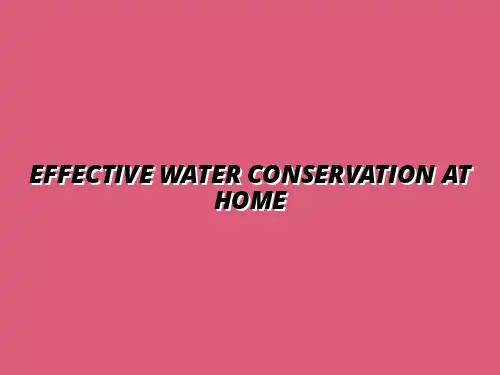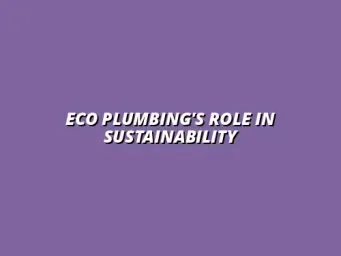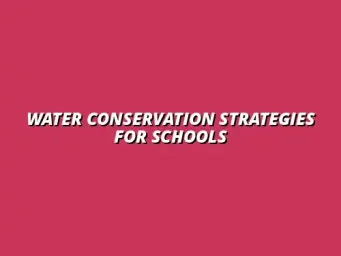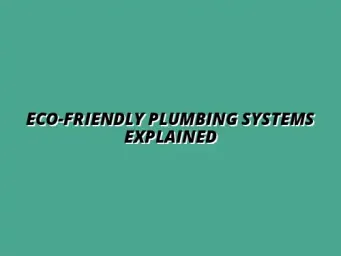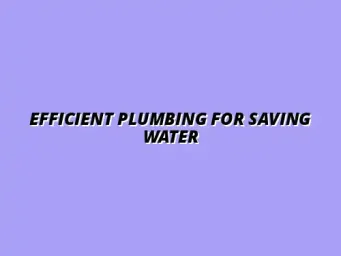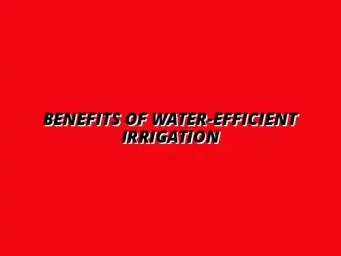Understanding Water Conservation in Residential Homes
Water conservation is becoming increasingly important in our daily lives. As we face challenges like climate change and growing populations, the way we use and manage water in our homes can make a significant difference. By understanding the need for water conservation, we can actively participate in protecting our most valuable resource.
In residential neighborhoods, the impact of individual water usage often gets overlooked. Simple steps can collectively lead to a positive change for the environment and our communities. It's essential to recognize that each small effort contributes to a larger goal of sustainability. For practical tips on reducing daily water waste, check out these daily water saving tips.
The Importance of Water Conservation in Daily Life
Water plays a vital role in our daily routines, from drinking and cooking to cleaning and gardening. Conserving water is not just about saving money; it’s about ensuring that future generations have access to clean water. By making conscious choices, we can all contribute to a healthier planet!
- Reducing water waste helps protect aquatic ecosystems.
- Conserving water can lead to lower utility bills.
- Promoting sustainable practices boosts community awareness.
Environmental Impact of Water Waste
When we waste water, we not only deplete this precious resource but also harm the environment. Excessive water usage can lead to depleted rivers and dried-up lakes, negatively impacting wildlife habitats. By understanding these effects, we can become more responsible in our consumption habits.
Every drop counts! Even small changes, like fixing leaks and using water-efficient appliances, can have a significant impact on reducing our overall water footprint. It's a reminder that everyone can make a difference. Regular maintenance of your water heater is crucial for efficiency; learn more about maintaining your water heater efficiently.
Economic Benefits of Reducing Water Consumption
Saving water has clear economic benefits for homeowners. When we use less water, our utility bills decrease, which can lead to substantial savings over time. Additionally, investing in water-efficient fixtures often pays off in the long run!
- Lower water bills from reduced consumption.
- Increased property value through water-efficient upgrades.
- Potential rebates and incentives from local governments.
Effective Water Conservation Techniques for Homeowners
There are many effective techniques homeowners can adopt to conserve water. From smart irrigation systems to low-flow fixtures, the options are plentiful. Implementing these practices not only helps the environment but also allows for significant savings in household expenses. For more comprehensive water-saving tips for your home, explore this helpful guide.
As we explore these techniques, I encourage you to consider which methods resonate most with your lifestyle. By making small adjustments, each of us can contribute to a larger movement of water conservation!
Implementing Efficient Irrigation Systems
Efficient irrigation systems are key to preserving water, especially for those who enjoy gardening or landscaping. By choosing the right irrigation method, we can ensure that plants receive adequate water while minimizing waste. Let’s explore some common options!
- Drip irrigation: Directly delivers water to the roots of plants.
- Soaker hoses: Allows water to seep slowly into the soil.
- Traditional sprinklers: Best for larger areas but can be less efficient.
Drip Irrigation vs. Traditional Sprinklers
When comparing irrigation methods, drip irrigation stands out for its efficiency. It delivers water directly to the soil at a slow rate, minimizing evaporation and runoff. In contrast, traditional sprinklers cover a larger area but may waste water through overspray or evaporation.
Choosing the right system ultimately depends on your specific needs and garden layout. Assessing your yard can lead to informed decisions that promote conservation!
Smart Irrigation Controllers and Their Benefits
Smart irrigation controllers take water management to the next level by adjusting watering schedules based on weather conditions. These devices use real-time data to provide the right amount of water at the right time, significantly reducing waste. Homeowners can enjoy lush gardens without the guilt of overwatering!
Additionally, many smart controllers can be operated via smartphone apps, making it easier than ever to manage water usage from anywhere. This technology not only conserves water but also enhances convenience. Proper kitchen plumbing maintenance is also essential for preventing leaks and water waste. Read more about essential kitchen plumbing maintenance.
Addressing Common Questions About Water Conservation
Many people have questions about water conservation, and it's essential to clear up any confusion. Understanding the facts can help us all make better choices when it comes to saving water. Let’s dive into some of the most common myths and how we can engage families, especially children, in meaningful ways!
What Are the Most Common Water Conservation Myths?
There are several widespread myths surrounding water conservation that can mislead homeowners. One common myth is that water-saving devices don’t work as effectively as traditional options. This is far from the truth! Many modern water-saving devices are designed to perform just as well, if not better, while using significantly less water.
Another myth is the belief that only large households need to worry about water conservation. Every household, no matter its size, can contribute to saving water. Let’s take a look at some common misconceptions:
- Low-flow showerheads reduce water pressure significantly.
- Using a dishwasher uses more water than washing dishes by hand.
- Rainwater harvesting systems are too complicated to set up.
Debunking Misconceptions About Water-Saving Devices
It’s important to educate ourselves about the actual performance of water-saving devices. For instance, low-flow fixtures are designed to maintain strong water flow while using less water overall. This makes them an effective choice for conserving resources. Learn more about essential bathroom plumbing maintenance to prevent leaks and maximize efficiency.
Also, many dishwashers now use less water than washing by hand, especially when fully loaded. It’s all about making informed decisions and recognizing the value of these devices. By sharing accurate information, we can encourage more people to adopt water-saving strategies!
How Can Families Involve Children in Water Conservation Efforts?
Involving children in water conservation efforts can be both fun and educational! Teaching kids about saving water not only helps the environment, but it also instills valuable habits for the future. Here are some exciting ways to engage children in this important cause:
- Create a water-saving challenge: Set goals and reward the family for achieving them.
- Turn off the tap while brushing teeth and make it a game.
- Involve them in gardening activities and explain the importance of watering wisely.
Fun Activities to Teach Kids About Saving Water
There are many fun activities that can help kids understand the importance of water conservation. You can organize a water audit at home, where children track how much water is used daily. This can lead to interesting discoveries!
Another idea is to create a “water diary” where kids can note when they save water and how it makes a difference. Through these activities, children can learn the value of water and become advocates for conservation within their community! Consider exploring rainwater harvesting as a sustainable water source.
Long-Term Benefits of Water Conservation in Homes
As we consider water conservation, it’s crucial to understand the long-term benefits that come with it. Not only does conservation lead to a healthier environment, but it can also contribute to lower utility bills and improve the overall quality of life in our communities.
Creating a Sustainable Future Through Water Efficiency
Water efficiency is key to building a sustainable future for everyone. When we implement simple changes in our homes, we can positively affect our environment. Here's how:
- Reduced water waste preserves natural habitats.
- Lower utility costs contribute to personal savings.
- Promoting sustainable practices encourages community involvement.
Case Studies: Successful Water Conservation in Local Communities
Many communities have successfully implemented water conservation practices, leading to noticeable improvements. For example, some neighborhoods have adopted rainwater harvesting systems, which have reduced their reliance on municipal water sources.
Another case study shows how community workshops on water efficiency have increased awareness and participation in conservation efforts. These real-world examples demonstrate that collective action can lead to significant changes! For help with plumbing issues in your area, consider contacting a local plumber such as those serving Kings Heath, Birmingham.
How to Measure Your Water Savings and Track Progress
Tracking your water savings can be motivating and rewarding! There are plenty of ways to measure and monitor your usage effectively. One convenient method is through the use of technology and apps designed for this purpose.
Using Technology and Apps to Monitor Water Usage
Several apps can help you keep track of your water consumption and set conservation goals. Some popular options include:
- WaterSmart: Provides personalized insights and recommendations.
- Dropcountr: Offers a visual representation of your water usage.
- Home Water Works: Helps you understand how to save water based on your habits.
Using these tools can make it easier to see your progress over time. Plus, it can be a fun family activity to evaluate how much water you've saved together!
Encouraging Community Participation in Water Conservation
Community involvement is essential to effective water conservation efforts. When we work together, we can create a more significant impact and foster a sense of responsibility in our neighborhoods.
The Role of Neighborhood Initiatives and Collaborations
Neighborhood initiatives play a crucial role in promoting water conservation. By organizing events and collaborating with local organizations, we can raise awareness and encourage collective actions. Here are some ways to get involved:
- Form a community garden that uses sustainable watering practices.
- Host a neighborhood clean-up, focusing on local water sources.
- Start a community newsletter to share tips and successes.
Organizing Community Workshops on Water Efficiency
Workshops can be an effective way to educate community members about water efficiency. These events can cover various topics, including rainwater harvesting, greywater systems, and efficient irrigation methods.
By promoting these workshops, we can empower individuals with the knowledge they need to make a difference. Together, we can create a ripple effect, inspiring others to join the water conservation movement!
Final Thoughts on Implementing Water Conservation Methods at Home
Implementing water conservation methods at home is a journey that starts with small, manageable changes. It’s all about making a few adjustments that can eventually lead to a more sustainable lifestyle.
Taking Small Steps Towards Bigger Changes
Every little action counts! Simple steps like fixing leaks, using efficient fixtures, and watering wisely can lead to significant water savings. By taking these small steps, we contribute to a healthier planet.
Encouraging Others Through Example and Education
Finally, one of the best ways to promote water conservation is by setting an example. When we practice what we preach, we inspire others to follow suit. Sharing our experiences and educating our friends and family can create a culture of conservation that benefits everyone!

